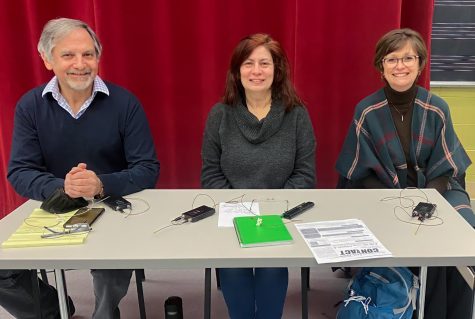COD Faculty: The Performing Arts Will Never Die
A deeper look into what “contact” entails in the performing arts amidst the COVID-19 pandemic and relevance in today’s society.
February 28, 2022

Is the performing arts still in contact with today’s modern society, or is it a dying form of live entertainment because of the COVID-19 pandemic? Professors Connie Canaday Howard and Lee Kesselman believe artful expressions connect with people in a way few things can.
On Feb 25. Connie Canaday Howard, chair of the theater department, and Lee Kesselman, lead of the music department, joined a panel discussion with Julia DiLiberti, the lead for the Humanities Festival, to discuss “Contact in the Performing Arts.” The word contact can be interpreted in many ways. Kesselman and Howard first interpreted contact in terms of different eras and periods of time that are brought into the present.
“I was trying to think of all the ways in which contact is a theme, or an idea that represents what we do in music,” Kesselman explained. “I think when we do music that is historical, we are in contact with those composers and their times, their civilization, their cultures and their languages.”
Howard said the experience is the same in theater.
“All of it is about connecting with people who may come at a particular piece or issue or theme with a different perspective than you, and opening your mind to different perspectives that are not your own,” she said. “It helps us all in understanding one another.”
As they each continued to explain about contact in a historical sense, Howard described how theater was run remotely during the pandemic, and how important interaction is for the theater.
“It’s all about interaction…we did produce entire shows through Zoom. There were contactless pickups for costumes, recording equipment, lights, green screens, and they [students] created studios in their homes. They gained all kinds of skills that would not have been taught if that had not happened.”
Although performers were able to connect with an audience entirely through Zoom, Howard would not want to repeat the experience.
“I would never want to be entirely remote again,” Howard said. “When my classes would meet through Zoom, they said they ‘lived for this class’ because of the interaction, and that’s why I think craving contact is one of the reasons why theater will always be around.”
Kesselman said the pandemic also changed the teaching of music classes.
“People sing. They sing in a room together; they hear each other. Technology, as good as it is, doesn’t really allow us to sing together online,” he said.
Kesselman then went on to talk about the continuity of the performing arts in regards to the ever-changing academic landscape.
“I think people have been making music together for tens of thousands of years. I don’t see that as changing,” he said. “I think the Greeks were doing theater, and we’re doing theater, and students love doing theater, and people love coming to theater, and the same thing is true with music.”

















